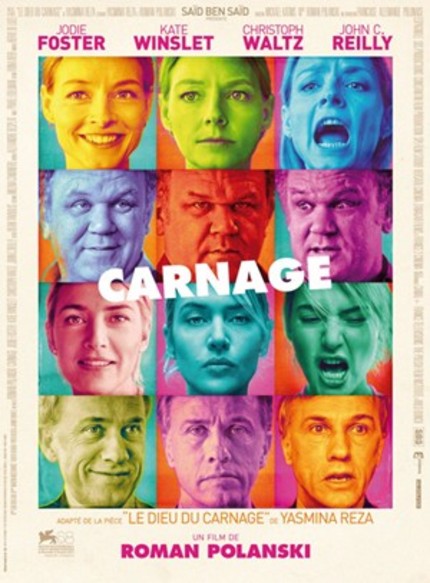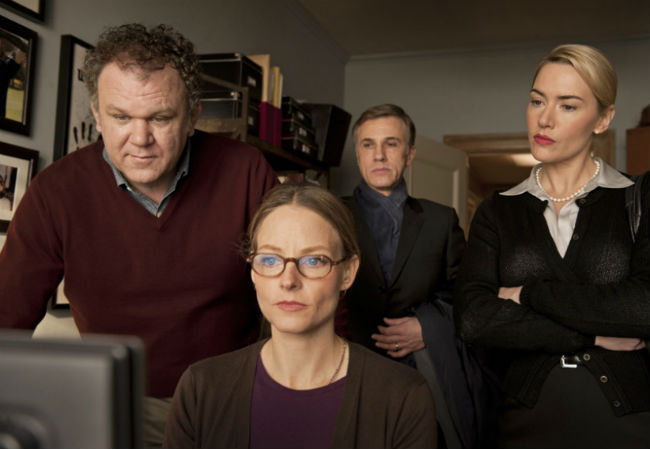CARNAGE Review

A witty comedy of manners, Carnage is directed with consummate skill by Roman Polanski and performed with great flourish and nuance by Jodie Foster, Kate Winslet, Christoph Waltz, and John C. Reilly. The actors embody characters who are surfing on sand with flying carpets, trying not to topple off into the abyss of Hell that awaits below.
Adopted for the screen by Polanski and Yazmina Reza from the latter's stage play "God of Carnage," the film is set almost entirely in a well-appointed Brooklyn apartment, yet it only feels claustrophobic at definite, story-appropriate moments. Polanski directs without calling undue attention to how the film is staged, but it really is a marvel of construction, utilizing a great variety of angles and composition, pulling one character or another into the foreground and then gently pushing the others around the apartment.
Likewise, it's photographed beautifully by Pawel Edelman -- Polanski's colloborator on The Pianist, Oliver Twist, and The Ghost Writer -- in a quiet riot of shadows and light, gently showcasing all manner of earth tones and the color register between blue and grey. The production design by Dean Tavoularis, the costumes by Milena Canonero, the editing by Herve de Luze, and the music by Alexandre Desplat all serve to complement the material.
And what does that material have to say?
The young son of Penelope Longstreet (Foster) and her husband Michael (Reilly) was involved in a public altercation with the young son of Nancy Cowan (Winslet) and her husband Alan (Waltz). The Longstreets hold the Cowan boy responsible, and the Cowans do not disagree; they have signed a statement to that effect. The meeting between the two couples in the Longstreets' apartment has concluded amicably, but one thing leads to another, and they end up spending hours talking, fighting, persuading, cajoling, accusing, vomiting, and blow-drying.
Their dispute is sparked by differing views on parental training, with Penelope incapable of controlling her outrage at what she perceives to be the Cowans' shortcomings. Michael endeavors to play the role of peacemaker when Penelope and Nancy begin exchanging evil glares and snide remarks, while Alan, an attorney, remains focused on his cell phone as he negotiates a very bad business day with his partners.
Throughout the movie, allegiances shift continually, with the discussion serving as a roiling sea of discontent. The couples initially stand firm with one another, and then their mutual defenses get chipped away, with everyone seeking solace and/or confirmation from whoever is open to their point of view in that particular moment. So, the argument slides from Penelope and Michael as a team to Penelope and Nancy finding common ground, and then Penelope finding herself standing alone; on the other side of the room, Michael shifts his allegiance freely from Penelope to Alan to Nancy, depending on which way the conversation twists.
The performances are exquisitely modulated, as are the quicksilver changes in tone from comic outrage to physical disgust -- I nearly had to leave the cinema during the vomiting sequence -- to moral one-upmanship to philosophical disputes to drunken banter to nasty arguments.
Polanski brings it all home with verve and craftmanship, and the running time simply evaporates. It's all very funny, infused with genuine wit, and filmed with sufficient style to keep any devoted cinephile happy. Carnage may only be a snapshot of a particular place and time, but it's a marvelously-detailed snapshot, played out with lively, fire-breathing color.
Carnage opens in New York and Los Angeles tomorrow before rolling out nationwide in the weeks to come. Check the official Sony Pictures Classics site for release dates and theater locations.








